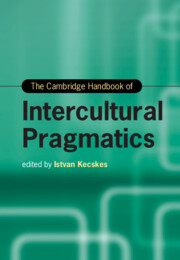Book contents
- The Cambridge Handbook of Intercultural Pragmatics
- Cambridge Handbooks in Language and Linguistics
- The Cambridge Handbook of Intercultural Pragmatics
- Copyright page
- Contents
- Figures
- Tables
- Acknowledgment
- Contributors
- Introduction The Rise of Intercultural Pragmatics
- Part I Theoretical Foundation
- Part II Key Issues in Intercultural Pragmatics Research
- Part III Interface of Intercultural Pragmatics and Related Disciplines
- 15 Semiotics and Intercultural Pragmatics
- 16 Sociopragmatics and Intercultural Interaction
- 17 Intercultural Pragmatics from the Perspective of English as a Lingua Franca
- 18 Intercultural Rhetoric
- 19 Politeness and Rapport Management
- 20 Corpus Pragmatics: Corpus-Based Intercultural Pragmatic Research
- Part IV Intercultural Pragmatics in Different Types of Communication
- Part V Language Learning
- Index
- References
20 - Corpus Pragmatics: Corpus-Based Intercultural Pragmatic Research
from Part III - Interface of Intercultural Pragmatics and Related Disciplines
Published online by Cambridge University Press: 29 September 2022
- The Cambridge Handbook of Intercultural Pragmatics
- Cambridge Handbooks in Language and Linguistics
- The Cambridge Handbook of Intercultural Pragmatics
- Copyright page
- Contents
- Figures
- Tables
- Acknowledgment
- Contributors
- Introduction The Rise of Intercultural Pragmatics
- Part I Theoretical Foundation
- Part II Key Issues in Intercultural Pragmatics Research
- Part III Interface of Intercultural Pragmatics and Related Disciplines
- 15 Semiotics and Intercultural Pragmatics
- 16 Sociopragmatics and Intercultural Interaction
- 17 Intercultural Pragmatics from the Perspective of English as a Lingua Franca
- 18 Intercultural Rhetoric
- 19 Politeness and Rapport Management
- 20 Corpus Pragmatics: Corpus-Based Intercultural Pragmatic Research
- Part IV Intercultural Pragmatics in Different Types of Communication
- Part V Language Learning
- Index
- References
Summary
This chapter presents some of the most significant studies in the history of intercultural pragmatics (IP) research that have applied the methodology of corpus pragmatics (CP). In fact, the use of corpora has been an essential contribution to IP in crucial areas such as formulaic language, context and common ground, or politeness research, among others, with the conviction that CP has redefined the conceptualization of pragmatic competence in a globalized world. The chapter follows a topical structure in which critical areas of research from an intercultural and corpus pragmatic perspective are addressed, like the role of the lingua franca; the use of academic, professional, and scientific language; cross-cultural studies; prosody, multimodality, and computer-mediated communication and learner's corpora. In all these areas, the chapter highlights the significant research concerns and achievements that have helped to shape IP as an essential discipline in current linguistic theory. A final section with conclusions and ideas for further research will ensue.
- Type
- Chapter
- Information
- The Cambridge Handbook of Intercultural Pragmatics , pp. 510 - 524Publisher: Cambridge University PressPrint publication year: 2022



